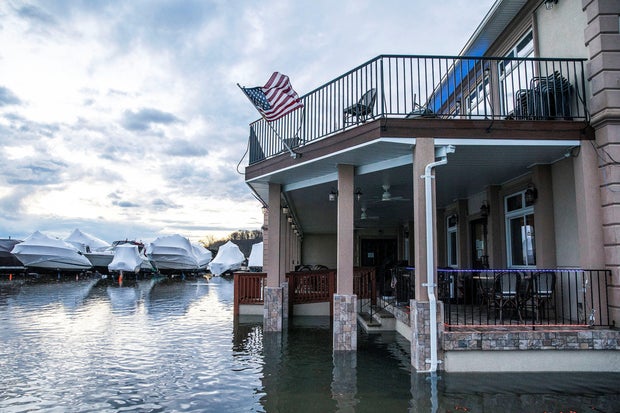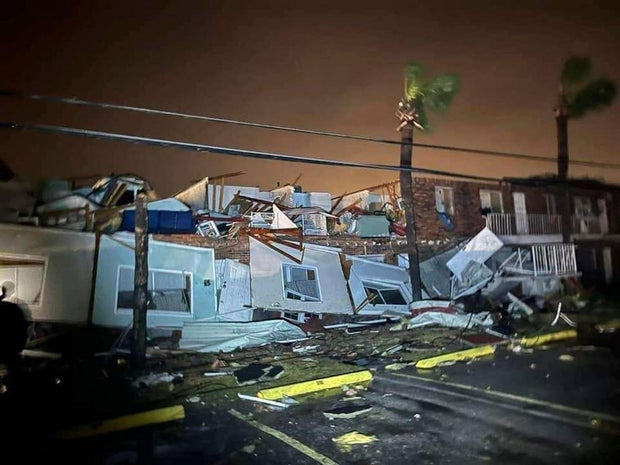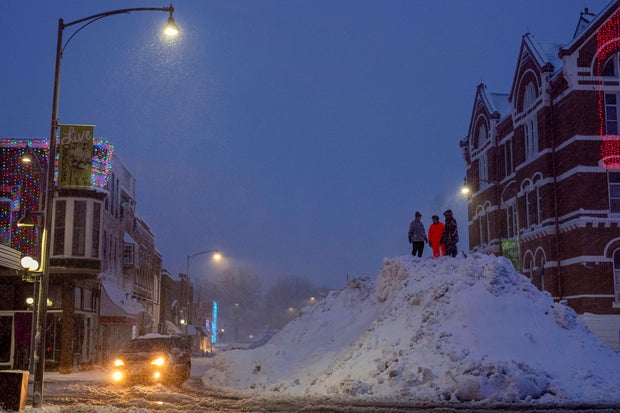A storm packing high winds and heavy rain was sweeping through the Northeast on Wednesday while wild winter weather elsewhere brought tornadoes and deadly accidents in the Midwest and South, flood threats in Florida and blizzards in the Northwest.
Hundreds of thousands of homes and businesses up and down the East Coast and in Michigan had no power early Wednesday, according to PowerOutage.us. And FlightAware.com said hundreds of U.S. flights were canceled as of Wednesday morning.
New Jersey Gov. Phil Murphy declared a state of emergency ahead of the storm on Tuesday afternoon and New York City officials evacuated nearly 2,000 migrants housed at a sprawling tent complex ahead of predicted wind gusts as high as 70 mph. Riverside communities were flooded in at least one New Jersey county Wednesday, CBS News New York reported. And police in Clinton, New Jersey, posted photos of flooding in their town on social media.
Reuters/Eduardo Munoz
The National Weather Service warned of possible major flooding in portions of Long Island with up to 9-foot seas through Wednesday morning and a chance of major and minor flooding along streams and rivers throughout the tri-state area, even though rain was expected to tail off.
At least 10 people had to be rescued from vehicles trapped in floodwaters in Prince George’s County, Maryland, and one was in critical condition, authorities there said on social media.
The storm knocked down trees and powerlines, caused flooding and left people without electricity throughout Maryland, CBS News Baltimore reported.
The wild weather came as portions of the Northeast were still digging out from a nor’easter that dumped more than a foot of snow in some areas over the weekend.
On Tuesday, a single weather system brought heavy rain, hail and several reported tornadoes to the South before moving eastward.
Rain and high winds extended into the nation’s capital Tuesday night, forcing Vice President Kamala Harris’ aircraft to divert from Joint Base Andrews to Dulles International Airport near Washington when it encountered wind shear – a sudden shift in wind direction or speed.
Near Cottonwood, Alabama, a small city near the Georgia and Florida borders, 81-year-old Charlotte Paschal was killed when her mobile home was tossed from its foundation, the Houston County coroner said. A suspected tornado had touched down in the area.
Police in Clayton County, south of Atlanta, said a man died during heavy rain when a tree fell on his car on a state highway in Jonesboro.
More than 80 public school systems across Georgia called off classes entirely while others taught students online or delayed the start of in-person classes.
In North Carolina, one person died and two others were in critical condition after a suspected tornado struck a mobile home park in the town of Claremont, north of Charlotte, said Amy McCauley, a spokesperson for Catawba County.
In Birmingham, Alabama, Tuesday morning, a tree fell on a car during a storm, trapping and killing the person inside, though authorities couldn’t say what caused the tree to come down.
A possible tornado knocked down several old brick storefronts in downtown Bamberg, South Carolina, blocking the main intersection through the city about 60 miles south of Columbia. Thousands of bricks blocked U.S. 301, the main road through that part of the state, and about 40 homes and businesses were damaged or destroyed, said Democratic Rep. Justin Bamberg, who represents the area.
Storm-related injuries were reported in Florida, but no deaths. A section of Panama City Beach showed parts of roofs blown away, furniture, fences and debris strewn about, and a house that appeared tilted on its side, leaning on another home.
Bay County Sheriff’s Office via AP
The National Weather Service office in Tallahassee planned to send out three tornado survey teams on Wednesday to examine suspected tornado damage in Walton, Bay and Jackson counties in Florida, and two more on Thursday to look at Houston County, Alabama, and Calhoun County, Georgia.
Many areas of Florida remained under flood watches, warnings and advisories early Wednesday morning amid concerns that streams and rivers were topping their banks. Gov. Ron DeSantis, who gave his State of the State address Tuesday as tornado warnings were active outside the Capitol, issued an executive order to include 49 counties in North Florida under a state of emergency.
Another storm that began Monday buried cities across the Midwest in snow, stranding people on highways. Some areas saw up to a foot of snow on Monday, including Kansas, eastern Nebraska and South Dakota, western Iowa, and southwestern Minnesota.
Andrew Harnik / AP
In southeastern Wisconsin, an SUV driver died Tuesday in a head-on collision with a semitrailer on a slushy, snowy state highway, authorities said.
Madison, Wisconsin, was under a winter storm warning into early Wednesday, with as much as 9 inches of snow and 40 mph winds on tap.
In western Michigan, a 35-year-old woman died Tuesday after she lost control of her minivan on a slushy highway and it collided with an SUV, the Lake County Sheriff’s Office said. The ambulance taking her to a Grand Rapids hospital, where she was pronounced dead, was struck by another vehicle en route there, and a second ambulance was needed to finish the transport to the hospital.
The weather has already affected campaigning for Iowa’s Jan. 15 precinct caucuses, where the snow is expected to be followed by frigid temperatures that could drift below zero degrees.
Forecasters warned snow-struck regions of the Midwest and the Great Plains that temperatures could plunge dangerously low because of wind chill, dipping to around minus 20 and even far lower in Chicago, Kansas City and some areas of Montana.
In the Pacific Northwest, a blizzard pounded Washington and Oregon mountains on Tuesday, knocking out power and prompting the closure of highways and ski resorts.
At one point, some 150,000 customers in those states were without electricity, although that was down to under 20,000 by late Tuesday night.





